
The Kennedy family is an American political family that has long been prominent in American politics, public service, entertainment, and business. In 1884, 35 years after the family's arrival from County Wexford, Ireland, Patrick Joseph "P. J." Kennedy became the first Kennedy elected to public office, serving in the Massachusetts state legislature until 1895. At least one Kennedy family member served in federal elective office from 1947, when P. J. Kennedy's grandson John F. Kennedy became a member of Congress from Massachusetts, until 2011, when Patrick J. Kennedy II retired as a member of the U.S. House of Representatives from Rhode Island.
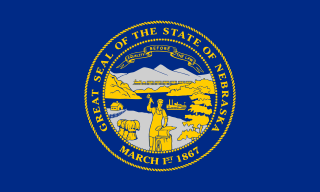
Nebraska is a landlocked state in the Midwestern region of the United States. It borders South Dakota to the north; Iowa to the east and Missouri to the southeast, both across the Missouri River; Kansas to the south; Colorado to the southwest; and Wyoming to the west. Nebraska is the 16th-largest state by land area, with just over 77,220 square miles (200,000 km2). With a population of over 1.9 million, it is the 38th-most populous state and the eighth-least densely populated. Its capital is Lincoln, and its most populous city is Omaha, which is on the Missouri River. Nebraska was admitted into the United States in 1867, two years after the end of the American Civil War. The Nebraska Legislature is unlike any other American legislature in that it is unicameral, and its members are elected without any official reference to political party affiliation. Nebraska is one of only two states that divide electoral college votes by district, and is not winner-take-all.
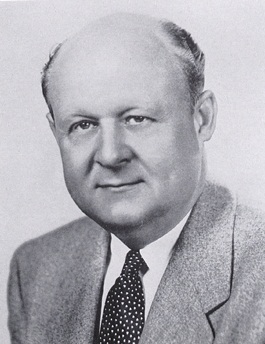
Frederick Valdemar Erastus Peterson, also known as Val Peterson, was an American politician and diplomat who served as the 26th governor of Nebraska from 1947 to 1953, as director of the Federal Civil Defense Administration from 1953 to 1957, U.S. ambassador to Denmark from 1957 to 1961, and U.S. Ambassador to Finland from 1969 to 1973.
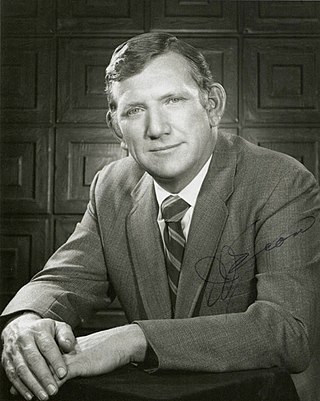
John James Exon was an American businessman and politician who served as the 33rd Governor of Nebraska from 1971 to 1979, and as a U.S. Senator from Nebraska from 1979 to 1997. A member of the Democratic Party, Exon never lost an election, and was the only Democrat ever to hold Nebraska's Class 2 U.S. Senate seat. He was elected governor in 1970, re-elected in 1974, elected to the Senate in 1978, and re-elected to that seat in 1984 and 1990.
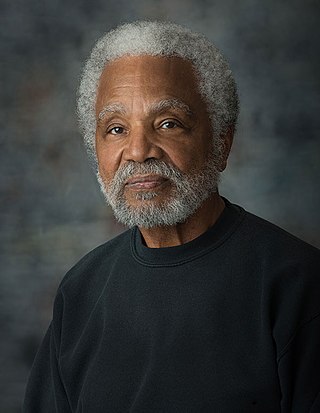
Ernest William Chambers is an American politician and civil rights activist who represented North Omaha's 11th District in the Nebraska State Legislature from 1971 to 2009 and again from 2013 to 2021. He could not run in 2020 due to term limits.

David Eugene Heineman is an American politician who served as the 39th governor of Nebraska from 2005 to 2015. A member of the Republican Party, he was the 39th treasurer of Nebraska from 1995 to 2001 and 37th lieutenant governor of Nebraska from 2001 to 2005 under governor Mike Johanns. Heineman took over the governorship after Johanns resigned to become the U.S. Secretary of Agriculture.

Charles Thone was an American Republican politician. He was the 34th Governor of Nebraska, serving from 1979 to 1983. He previously served as a member of the United States House of Representatives, representing Nebraska's 1st congressional district, from 1971 to 1979.

Ralph Frederick Beermann was an American Republican politician and US Representative for Nebraska.
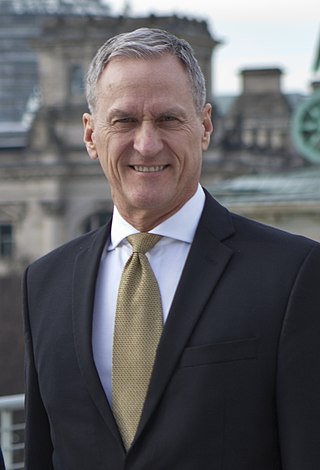
Dennis Martin Daugaard is an American attorney and politician who served as the 32nd governor of South Dakota from 2011 to 2019. A member of the Republican Party, he was the first chief executive of a U.S. state to be the child of deaf parents. Before being elected governor, he was a lawyer, banker, development director for a nonprofit organization; he also served as a state senator from 1997 to 2003 and the 37th lieutenant governor of South Dakota from 2003 to 2011.

Harvey Lowell Wollman was an American politician who served as the 26th Governor of South Dakota from 1978 to 1979. He was the first Lieutenant Governor in the history of South Dakota to succeed to the governorship. To date, he is the last Democrat to serve as South Dakota's governor.
John Joseph Billion was an American politician and physician who was the 2006 Democratic Party candidate for Governor of South Dakota and served as a member of the South Dakota House of Representatives from the 13th district from 1993 to 1997.

Sherlock James Andrews, was an American lawyer and abolitionist Congressman from Ohio. He became the 1st President of the Cleveland Bar Association and was one of the lawyers who defended the abolitionists in the Oberlin–Wellington Rescue Case with John Mercer Langston.
African Americans in Omaha, Nebraska, are central to the development and growth of the 43rd largest city in the United States. While population statistics show almost constantly increasing percentages of Black people living in the city since it was founded in 1854, Black people in Omaha have not been represented equitably in the city's political, social, cultural, economic or educational circumstances since. In the 2020s, the city's African American population is transforming the city's landscape through community investment, leadership and other initiatives.
Joel A. Swisher was an American college football coach and athletics administrator. He served as the head football coach at Dakota State University (1973–1976), Augustana College in Sioux Falls, South Dakota (1977–1980), Adams State College (1982–1983), and Jamestown College (1992–1994), compiling a career college football head coaching record of 65–55–4. Swisher was also the athletic director at Dakota State from 1974 to 1977.
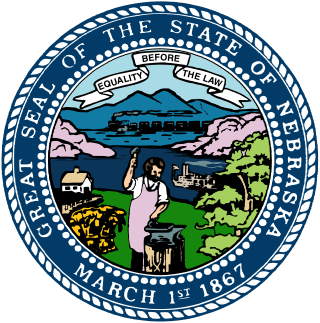
The 1994 Nebraska gubernatorial election was held on November 8, 1994. Incumbent governor Ben Nelson won a re-election to a second term in a landslide, defeating Republican businessman Gene Spence by 47.4 percentage points and sweeping all but two counties in the state. As of 2024, this is the last time that a Democrat was elected governor of Nebraska.

Frank Marsh was an American politician who served as the 29th lieutenant governor of Nebraska from 1971 to 1975. A member of the Republican Party, he also held the offices of Nebraska Secretary of State and Nebraska State Treasurer.

Marianne Means was an American journalist and syndicated political columnist based in Washington, D.C. who, for many years, was a White House correspondent. She started her career as a reporter and advanced to the role of a copy editor for a newspaper in Nebraska for a couple of years. She then relocated to Washington, D.C. where she took a position as the chief editor for a Virginia newspaper and supervised a staff of men for two years. She later transferred to Hearst Newspapers where she was a Washington bureau correspondent. She covered the reporting of John F. Kennedy's presidential campaign. Then she reported full-time at the White House and was the first female reporter to do this. There were rumors she was one of Kennedy's many lovers. She covered Kennedy's assassination and the transition to the administration of Lyndon B. Johnson. As a political reporter for The New York Times she reported on every presidential campaign from Kennedy to Bill Clinton. She was an international commentator and television personality.

Nathan Marcellus Parsons was an American pharmacist and politician. A Democrat, he was elected to a very brief term as the 21st lieutenant governor of Nebraska - about two months in late 1938 and early 1939.
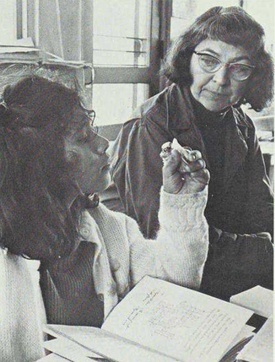
Woesha Cloud North was an American artist, teacher, and activist. She taught in the Palo Alto Public schools from 1961 to 1969 and then assisted in running the school during the Occupation of Alcatraz. From the early 1970s, she began to teach at the university level, teaching art at San Francisco State College, the University of Nebraska–Lincoln, and California State University, Fresno. Throughout her life, she was active in women's organizations and organizations focused on indigenous people. Posthumously, her service was honored with an induction into Stanford's Multicultural Alumni Hall of Fame in 1995.
















